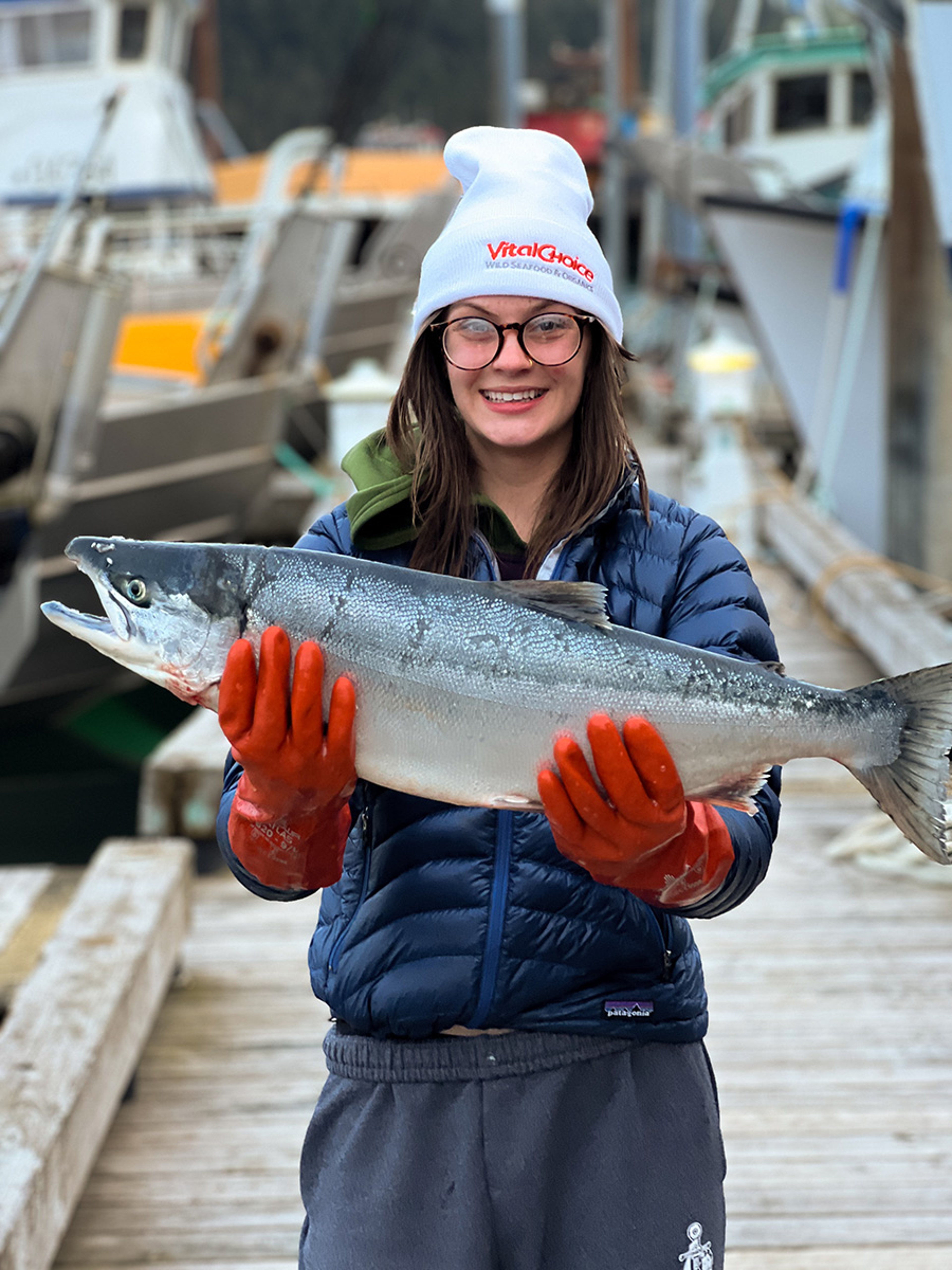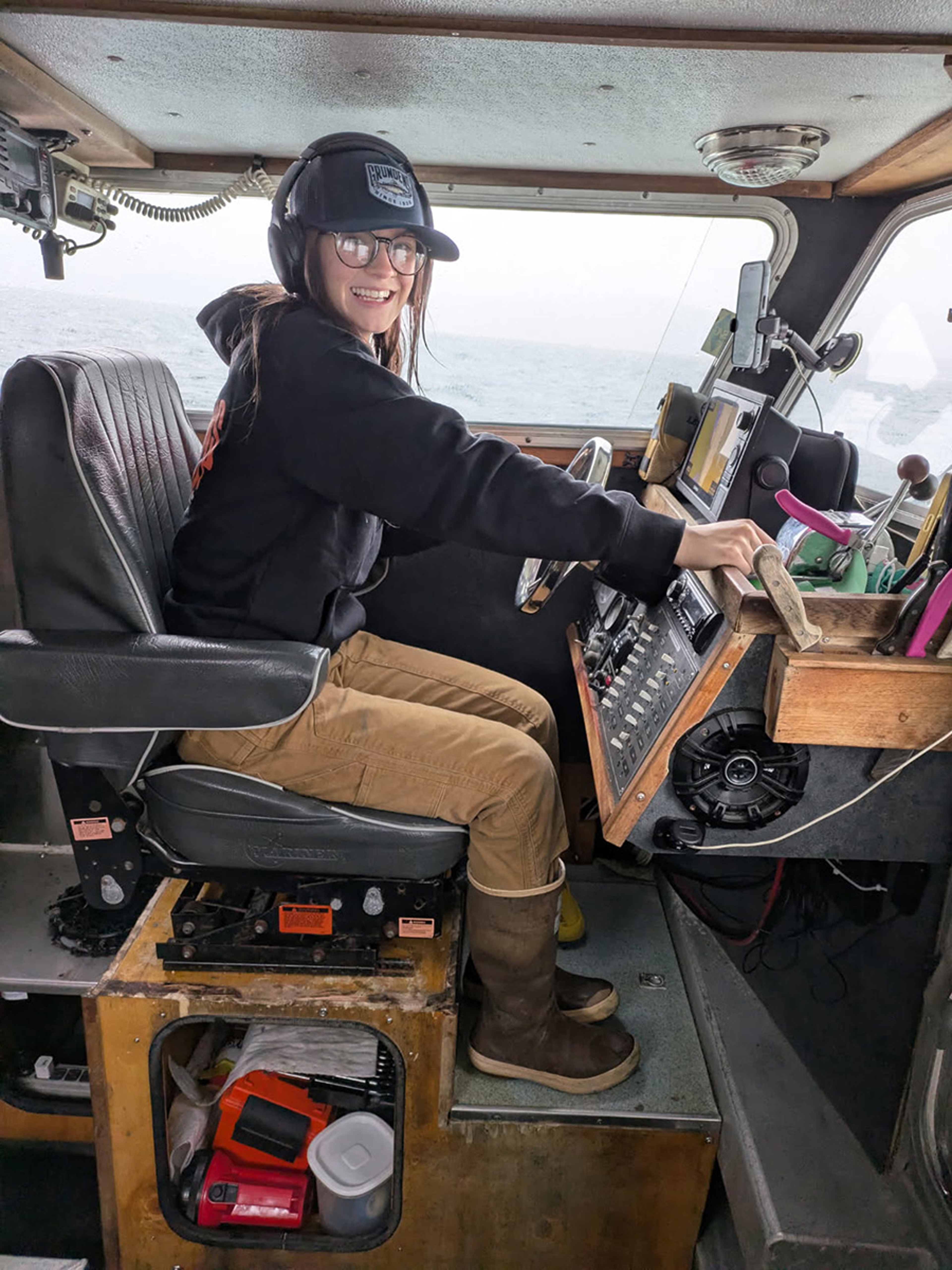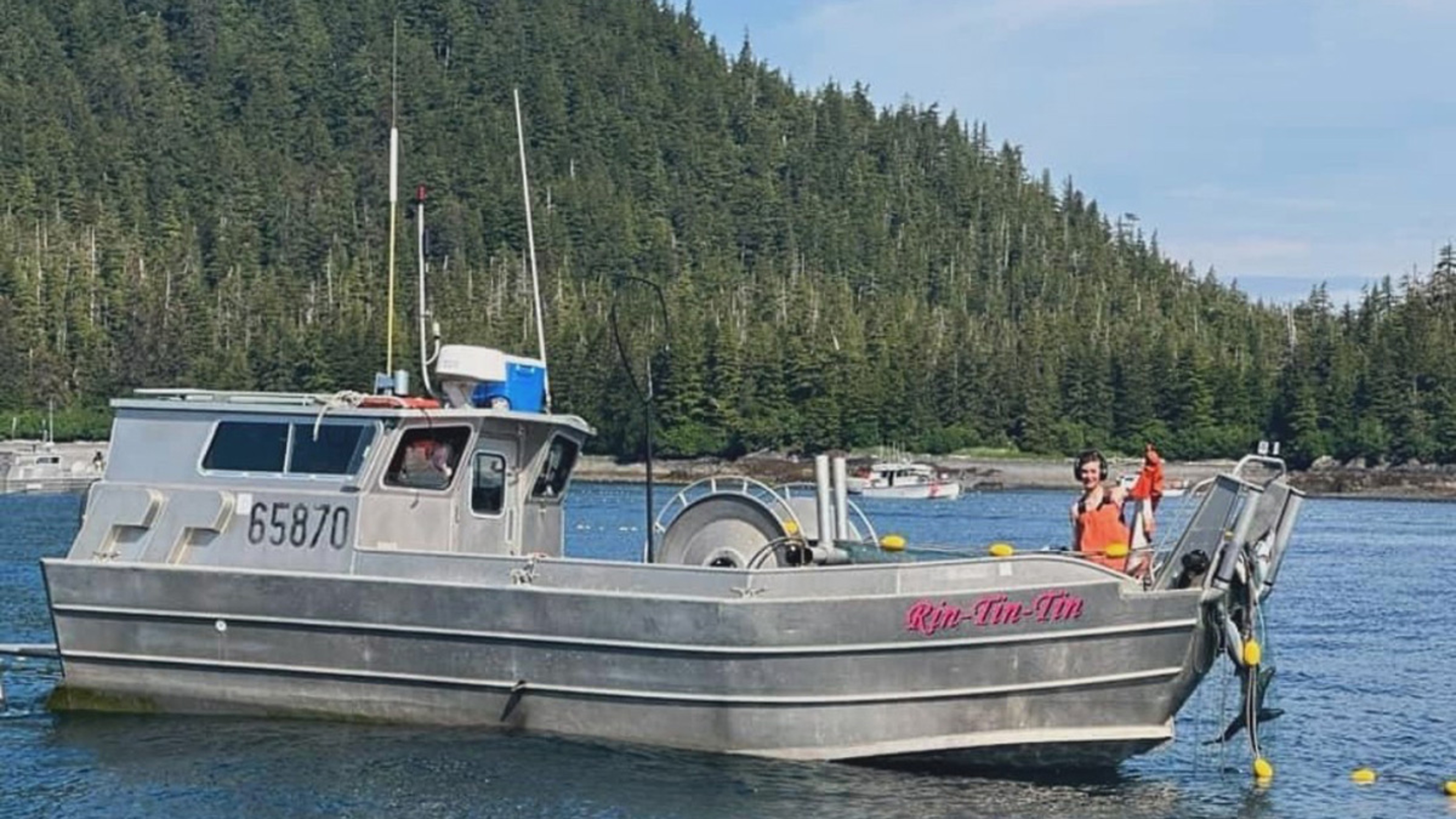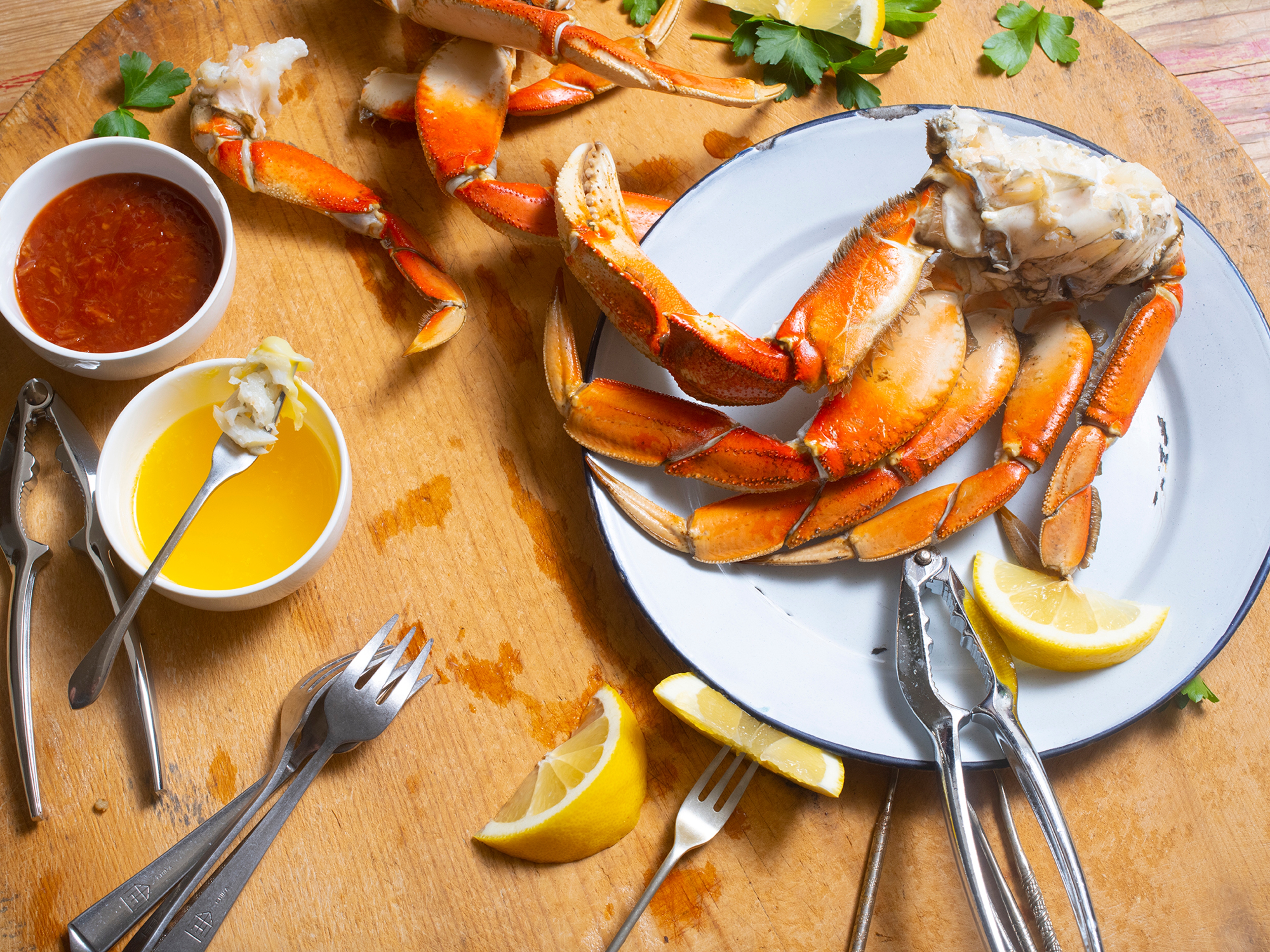Going In-Depth With Alaskan Fisherman Kiley Burton
She’s only 20 and is catching the attention of her fellow captains.
Oct 09, 2025
"I tried to sink my boat yesterday," Kiley Burton told me, only half joking. "I had a gasket that sucks in raw water fail, so it was spewing saltwater into my engine room!" And that’s how my conversation with this young commercial fisherman from Cordova, Alaska, began.
Burton’s been driving her own boat since she was 18. It’s a powerful single-diesel bowpicker — a boat designed for salmon gillnet fishing — named Rin-Tin-Tin. It’s painted pink and plastered with her cousin's handmade stickers. She takes it out for a few months a year to do her job on the dangerous Copper River flats. About fixing her boat, she admitted, “Half the time I don't know what I'm doing — you learn as you go."
Still, things can always be worse: "You can blow up your entire motor, and then you're dead and out fifty grand."

Burton, 20, started fishing at 5 years old with her dad and later worked as crew on her stepdad’s boat. This past salmon season, she was one of just two women gillnetters. Unlike the salmon fishing method called “seining” that she grew up with — where a larger boat (a seiner) and a smaller boat (a skiff) work together to encircle a school of fish — gillnetting is solo work. She sets a long mesh net like a curtain, with floats (“corks”) holding the top at the surface and weights pulling the bottom down, to catch three of the five species of salmon: king, sockeye, and keta.
Gillnetting goes back to antiquity, and though Burton’s family has not been doing it for that long, she can trace her Alaskan roots six generations deep: “Everyone’s tied into fishing somehow — my dad, stepdad, grandpa, even my mom, all fished; I was born into it. Most people here fish because of family connections. Once you’re tied in, you can’t really ever stop.”
She shares with us the risks of her job, why being a woman fisherman matters, and what will make her actually stop fishing.
How often do things break on your boat?
Seems like every time I'm having a great morning, something breaks in the afternoon. Boats are like cars; stuff goes wrong. The only difference is that if my boat goes down, my whole income goes down with it.
Does your dad or stepdad help you out? Are they mentors?
I call them both for help almost every day, and text them when I have a good day. They are both fishermen and my stepdad is a diesel mechanic, so they get it.
Do you feel like you get treated differently as a female fisherman?
Honestly, I get left alone more. People are surprised to see me own my own boat, but I don't feel targeted. More like shock: "That's your boat!?"
As one of the few young women out there, do you feel pressure?
I do. Growing up, there weren’t a lot of women in fishing.
My mom was my role model. She was a commercial fisherman, and she kept fishing after she had me. When she and my dad divorced, my dad got the boat, and she stopped fishing. But, during summers, when I wasn’t with my dad, she got back into it — then she had another baby. She now owns a fur sewing business.
Now there are more [women fishermen], but I feel like I have to uphold it for younger girls, show them it’s possible to have your own boat.
I also substitute teach in the kindergarten classroom, and there are a lot of little girls who’ll say, “My dad fishes.” I tell them, “If I can fish, you can fish. One day, you can have your own boat.”
How demanding is gillnetting?
Depends on how big the set is [a set is the haul of fish you catch each time you put your net in the water]. If I've got 20 fish, it's easy. But fifty to three hundred? Your hands hurt, your body hurts. You're standing all day, watching your net, picking fish, driving. I touch every fish three times: pick it out of the net, throw it into the hold, then offload it to the tender.
And when it's king salmon season, it's even more pressure. Each [fish] can be worth hundreds of dollars. If I drop one, that's $500 gone — there goes my fuel payment!
How competitive is salmon fishing?
It's competitive, especially when the fishing is really good. Some people work in radio groups, sharing numbers. But it can also be cutthroat.
Tell me more.
There's this thing called “corking” — you lay your net right in front of someone else's to cut the fish off from them. I've been corked, and I've corked people too — I’ve got to be really angry to cork you. Also, people yell. I've seen guys ram each other.
Do you hang out with one another afterward?
I'm dating a fisherman — Matt Blake! We fish on our own boats, but we help each other out if we can.

The Copper River flats are notorious for unpredictable currents, sudden surges, and silty conditions. What is the scariest thing that you experienced out there?
Storms. I've had to pull out my survival suit once — a giant, bright red or orange neoprene thing. You look like a Teletubby, but it keeps you afloat and warm if you have to abandon ship. My friend had a wave hit his boat so hard that it blew his window out. Last year, a wave dented my boyfriend's bow and blew his window too.
How do you deal with the mental stress of your job?
I don't relax when the boat is in the water. I'm always worried — storms, sinking, breaking down. Even in winter, when it's on the trailer, I worry about windstorms or snow damaging the trailer. I'm anxious, I overthink everything, but in a way, being mentally prepared for the worst helps. Nothing really takes me by surprise.
What are the sacrifices of being an Alaska fisherman?
People risk their lives; you're also sacrificing family time and health. It's one of the most dangerous jobs. Boats are unpredictable, fish are heavy, and you can fall overboard. I’ve known people who’ve broken their backs. I once almost went in trying to pull a sea otter aboard, and my cousin had to grab me by the pants. And most people don’t even wear life jackets — which is crazy! I should.
And it's expensive. When I started, I was $230,000 in debt. Boats can cost $300,000 or more. You need a permit, nets, gas, gear. Every opener, when a fishery is legally open for fishing, you're gambling. You can win big, or you can lose everything.
Do you ever want to quit?
Never. Some mornings I wake up like, "This again?"

Why do you do it, then?
I have the freedom to go anywhere I want; I can make my own decisions and make a year's income in three months.
And the places: I've fished right in front of glaciers, set my gillnet off waterfalls; Prince William Sound is one of the most magical places to fish. The flats are gray and sandy, but the sunrises and sunsets out there are amazing.
Fishing means a lot, it's in my DNA, but I don't see myself doing this forever. I want to have a family of my own and pass fishing on to my kids one day. I will give up fishing for that. But for right now, this is a great way to spend my summers.
What's a fun fact about your boat?
It's called Rin-Tin-Tin, after the German shepherd in the movie. But if I could rename it, I'd call it In Depth or Headstrong — you have to be pretty stubborn to do this job — but you're not supposed to change the name of your boat since it's bad luck.
What is the best advice you've ever received?
Someone once told me, "It’s not a sprint, it's a marathon."
What is the best advice you can give someone?
Don't be afraid to take other people's advice, because they're probably right.







